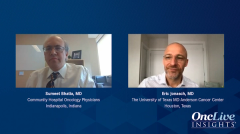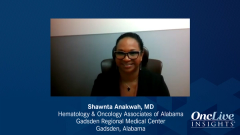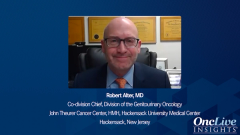
Patient Profile Presentation: A 58-Year-Old Woman Presenting with Gross Hematuria
Arnab Basu, MD, presents the patient profile of a 58-year-old woman with advanced renal cell carcinoma presenting with gross hematuria.
Episodes in this series

Arnab Basu, MD: Hello, and welcome to this OncLive® My Treatment Approach program titled, “Improving Outcomes in Advanced RCC: Translating Evidence to Clinical Practice.” I am Arnab Basu, assistant professor, O’Neal Comprehensive Cancer Center, School of Medicine, University of Alabama in Birmingham. I am joined today by my colleague Dr Shawnta Anakwah. I would like to ask Dr Anakwah to introduce herself please.
Shawnta Anakwah, MD: Hello. I’m Dr Anakwah and I am a community-based oncologist in Gadsden, Alabama, affiliated with HOAA [Hematology & Oncology Associates of Alabama] and the Gadsden Regional Medical Center.
Arnab Basu, MD: Welcome, and thank you for so joining me today. Today, we are going to discuss recent advances in the treatment of advanced RCC [renal cell carcinoma] and their impact on clinical practice. We will present 3 real-world patient cases and discuss our treatment approach to illustrate how we incorporate recent data in our practice. Let’s get started on our first case. Our first case is a 58-year-old lady who presented with gross hematuria. She had a left-sided renal mass associated with left renal vein tumor thrombus on CT scan. She was seen by urology and underwent a left-sided open radical nephrectomy and IVC [inferior vena cava] caval thrombectomy. Her pathology revealed a clear cell renal cell carcinoma, 8.1 cm in greatest dimension. She had a Fuhrman grade of 4, extending into the renal sinus and renal vein. Her vein margin was positive for carcinoma. We did not find any LVI [lymphovascular invasion], and thankfully the nodes were negative.
Unfortunately, as you might have expected, the first postoperative surveillance scans showed new liver lesions and pulmonary lesions on CT, increasing size of retroperitoneal lymph nodes, and a confirmatory MRI was again showing increasing size of hyper-enhancing lesions on triple-phase scans. She was very fit, no major comorbidities, with an ECOG [performance status] of 0, calcium 10.4 [mg/dL]. White blood cell count 8400 [per μL], hemoglobin 14.5 [g/dL], normal platelet count. She qualified as IMDC [International Metastatic RCC Database Consortium] intermediate risk from her diagnosis within 1 year. We did have NGS [next-generation sequencing] data on her as well, which showed she had some typically found mutations in RCC ,including VHL, PBRM1, and BAP1.
We discussed treatment options, and we’ll delve into that later, but we initiated the patient on pembrolizumab 200 mg every 3 weeks in conjunction with 20 mg of lenvatinib every day per the CLEAR trial. Her first scan on therapy continued to show her liver lesions. However, there was clear evidence of decreased enhancement from her prior exams, showing that there was likely some treatment response. And there was a decrease in her retroperitoneal lymphadenopathy. We continued her on pembrolizumab and lenvatinib based on these scans. Unfortunately, she did develop some adverse effects, with increasing high blood pressure and mouth sores interfering with intake. We were able to manage the stomatitis with some dexamethasone mouthwash, and her hypertension was treated with a calcium channel blocker and then an ACE [angiotensin-converting enzyme] inhibitor. Her follow-up scans then started to show a decrease in the size of all the liver lesions, decrease in the size of her retroperitoneal lymph nodes, which continued from her last scan, and stability of the lung nodule. By RECIST, she was in a confirmed PR [partial response] afterward.
Transcript edited for clarity.








































